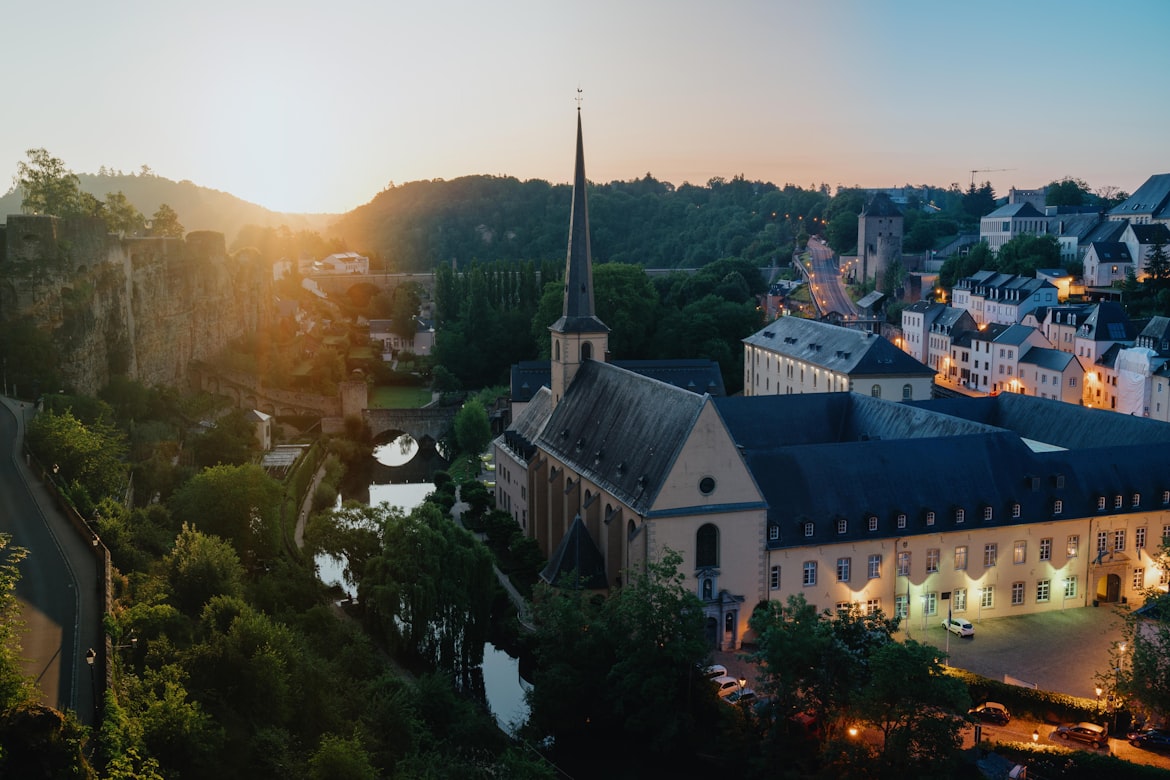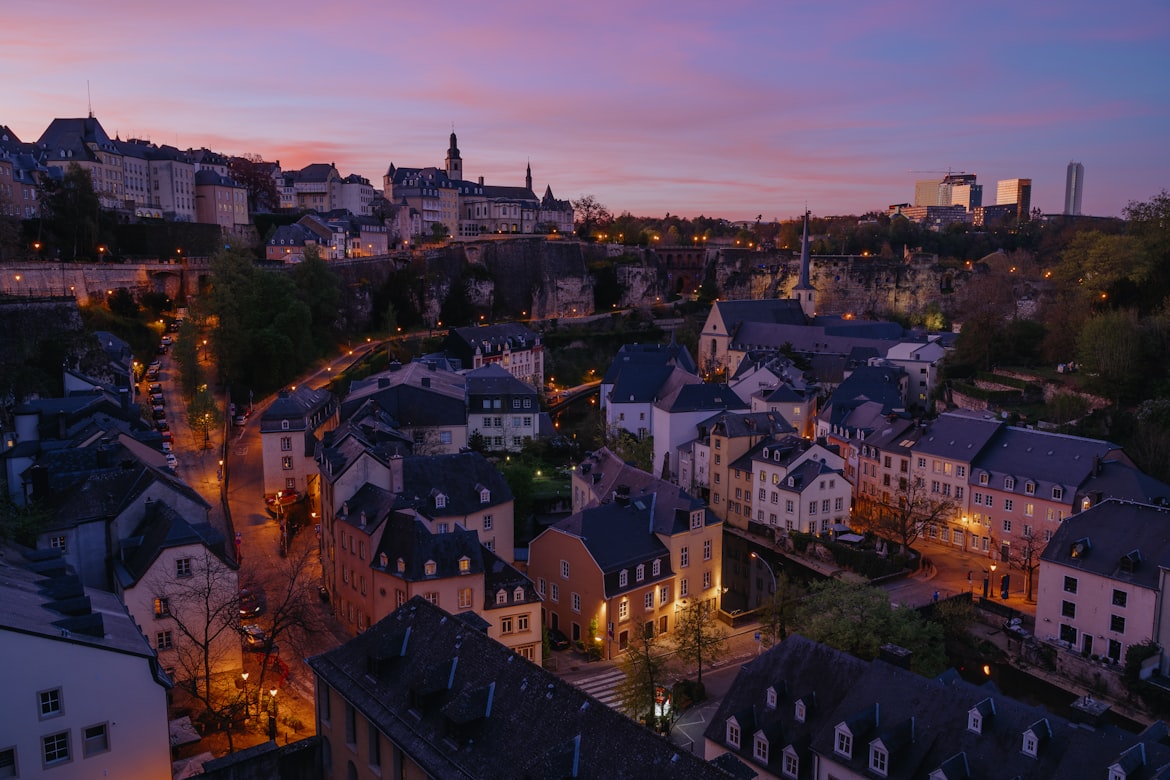Top Attractions
Luxembourg may be one of Europe’s smallest countries, but it is bursting with remarkable attractions that reflect its unique blend of medieval charm, modern sophistication, and natural beauty. The capital, Luxembourg City, is a UNESCO World Heritage Site and is perched dramatically atop cliffs overlooking deep gorges carved by the Alzette and Pétrusse rivers. Walking through the Old Town, visitors can explore the historic Casemates du Bock—underground tunnels and fortifications dating back to the 17th century—and marvel at panoramic views from the Chemin de la Corniche, often referred to as “Europe’s most beautiful balcony.”
The Grand Ducal Palace is an elegant Renaissance building that remains the official residence of the Grand Duke, and nearby Notre-Dame Cathedral blends Gothic and Renaissance styles with stained glass and serene cloisters. A visit to the Place Guillaume II square reveals a lively area lined with restaurants and local markets. For art lovers, the Mudam (Museum of Modern Art Grand-Duc Jean) presents striking architecture and a thought-provoking collection of contemporary works.
Outside the capital, the fairytale town of Vianden is home to the majestic Vianden Castle, perched on a hill and surrounded by forested valleys. The Moselle Valley, along the southeastern border, is a picturesque wine region filled with vineyards, river views, and charming villages like Remich. Nature lovers will also be drawn to the Mullerthal Region, known as “Little Switzerland” for its forest trails, moss-covered rock formations, and waterfalls.
Local Dishes
Luxembourgish cuisine reflects its geographic and cultural intersection between Germanic and French traditions, resulting in a hearty and flavorful culinary experience. One of the most traditional dishes is judd mat gaardebounen, a smoked pork collar served with broad beans in a savory sauce, typically accompanied by boiled potatoes. Bouneschlupp is a green bean soup thickened with potatoes and onions, often enhanced with bacon or sausage and served as a warming starter.
Gromperekichelcher, crispy potato fritters spiced with garlic and parsley, are a popular street food found at local fairs and markets. Pastry lovers will enjoy quetschentaart, a rich plum tart that showcases the country’s love of seasonal fruit desserts. For a sweet finish, try verwurelter, twisted doughnuts dusted with powdered sugar, traditionally eaten during the carnival season.
The local beverage scene is just as distinctive. Luxembourg produces excellent white wines, particularly Riesling and Pinot Gris, from its vineyards along the Moselle River. The country also has a thriving beer culture, with local breweries offering craft lagers and ales in cozy taverns and modern brewpubs.
Transportation Tips
Luxembourg is remarkably well-connected for a small country, and since March 2020, all public transportation within the country has been free of charge. This includes buses, trams, and trains, making travel between cities, towns, and tourist attractions exceptionally easy and affordable. Luxembourg City’s tram network is modern and efficient, while national trains connect destinations like Ettelbruck, Vianden, and Esch-sur-Alzette quickly.
For reaching remote hiking areas or wine villages, rental cars provide flexibility, although roads are well-marked and traffic is typically light. If you prefer cycling, Luxembourg has a growing network of bike paths, and rental bikes are available in major towns through platforms like vel’OH!. International travel to and from Luxembourg is also straightforward, with high-speed train links to Paris, Brussels, and Germany, as well as a well-connected airport just outside Luxembourg City.
Budget Travel Tips
While Luxembourg is often considered a wealthy and high-cost country, budget-conscious travelers can still explore it affordably with a bit of planning. Free public transportation significantly reduces travel expenses, and many museums offer free entry on specific days each month. Walking tours of the Old Town are a great way to see the sights without spending a cent, and exploring parks, scenic viewpoints, and historical trails costs nothing.
Budget accommodations can be found in the form of hostels and guesthouses, particularly in Luxembourg City and Echternach. Camping is also a popular and inexpensive option, especially in the countryside and near natural parks. Dining out can be pricey, but bakeries, supermarkets, and casual cafés offer reasonably priced meals. Midday set menus (menu du jour) at restaurants provide excellent value.
Safety Info
Luxembourg is one of the safest countries in the world, with very low levels of crime and a strong sense of civic order. Violent incidents are virtually nonexistent, and petty crimes like pickpocketing are rare but can occasionally occur in busy transit hubs. Emergency services are efficient and accessible via the EU-wide number 112.
The healthcare system is excellent, and pharmacies are well-stocked for minor health issues. Tap water is perfectly safe to drink, and hygiene standards are high across the country. Travelers should still remain aware of their belongings and practice standard travel precautions in urban settings.
Cultural Etiquette
Luxembourgers are generally polite, reserved, and appreciate formality and punctuality. A handshake with eye contact is the customary form of greeting, and people tend to address each other with titles and last names until invited to use first names. Respect for personal space and quiet conversation tones are appreciated, especially in public places.
It’s considered rude to speak loudly in restaurants or on public transport. When dining, wait for everyone to be served before starting to eat, and it’s customary to wish others "bon appétit." Luxembourgers value multilingualism, and you’ll find many people switching between Luxembourgish, French, German, and English with ease. A few words in Luxembourgish, such as "Moien" (hello) or "Merci" (thank you), can go a long way in showing cultural appreciation.
Travel Style Fit
Luxembourg is best suited for travelers who enjoy elegant cities, tranquil countryside, and a blend of history and modern convenience. It’s ideal for solo travelers seeking safety and ease, couples looking for romantic castles and scenic drives, and culture enthusiasts drawn to museums and UNESCO sites. Nature lovers will appreciate the hiking opportunities, while foodies can indulge in French-influenced cuisine and Moselle wines. Whether you’re looking for relaxation, cultural immersion, or refined adventure, Luxembourg delivers a rich and rewarding travel experience.

Best Time to Visit
The best time to visit Luxembourg is from late spring to early autumn, particularly between May and September, when the weather is warm and most attractions are in full swing. Summer is ideal for hiking in the Mullerthal trails, wine tasting along the Moselle, and attending cultural festivals like the Schueberfouer funfair in August.
Spring, from April to June, brings blooming flowers and fewer crowds, making it perfect for exploring castles and countryside. Autumn offers spectacular foliage in the forests and grape harvest celebrations in wine towns like Grevenmacher. Winter, while colder and quieter, transforms Luxembourg City into a cozy Christmas destination, with festive markets, ice rinks, and decorated squares.
Accommodation Recommendations
For travelers on a tight budget, Luxembourg offers several affordable hostels, such as the modern and clean Luxembourg City Youth Hostel, located near the Alzette River with panoramic views and easy access to Old Town. Campgrounds are also available in scenic areas like Vianden and Esch-sur-Sûre, providing a budget-friendly option for nature lovers.
Mid-range travelers can enjoy boutique guesthouses or family-run hotels such as Hotel Parc Belle-Vue, which offers comfortable rooms and garden views in the capital. In the countryside, charming inns like Hotel Heintz in Vianden provide a cozy atmosphere near key historical sites.
For a luxury experience, the Sofitel Luxembourg Le Grand Ducal combines modern elegance with river views and gourmet dining. In the Moselle region, Chateau de Schengen offers a refined stay with proximity to vineyards and river cruises.
Languages Spoken
Luxembourg has three official languages: Luxembourgish, French, and German. French is commonly used in administration, menus, and legal documents, while German is used in newspapers and some formal writing. Luxembourgish is spoken in daily conversation and is the national language that binds the culture together.
English is widely spoken, particularly in Luxembourg City, tourist areas, and among younger generations. Travelers will have little trouble navigating the country linguistically, especially when using English in hotels, restaurants, and shops.
Currency
Luxembourg uses the Euro (EUR) as its official currency. Credit and debit cards are widely accepted in restaurants, hotels, and stores, though it’s advisable to carry a small amount of cash for use in smaller establishments or markets. ATMs are plentiful and reliable.
Tipping is not obligatory, as service is typically included in the bill, but rounding up or leaving a few euros for good service is appreciated. Taxi drivers and hotel porters also welcome small tips as a gesture of thanks.
Common Traveler Mistakes to Avoid
One common mistake is underestimating how much Luxembourg has to offer by only spending a day or two. Visitors who rush through the capital often miss out on the stunning countryside, castles, and cultural richness found in regions like the Mullerthal or Moselle Valley.
Another misstep is not taking advantage of the free public transportation system, which can save both time and money. Some travelers also assume that only French is spoken and may be surprised by the multilingual environment. Being prepared with a basic understanding of local linguistic diversity and public etiquette enhances the travel experience.
Essential Apps & Tools
The Mobilitéit app is essential for navigating Luxembourg’s free public transportation system, with real-time schedules and route planning. VisitLuxembourg provides detailed guides and event listings across all regions. Google Maps works well for city navigation and walking tours. Booking.com and Airbnb are reliable platforms for finding accommodations, and the “Luxembourg Card” app offers discounts on museum entries and guided tours. Language apps like Duolingo or PONS can be helpful for brushing up on French or German.
Suggested Itinerary Styles
A five-day itinerary offers a fulfilling taste of Luxembourg’s history, nature, and culture. Begin in Luxembourg City with two days dedicated to exploring the Old Town, Casemates du Bock, and museums. Take a scenic walk along the Chemin de la Corniche and visit the Grand Ducal Palace.
On day three, head to Vianden to tour its picturesque castle and relax in a riverside café. The fourth day can be spent hiking the trails of Mullerthal or exploring Echternach, Luxembourg’s oldest town. Finish your journey with a day in the Moselle region, sampling local wines and enjoying a boat cruise along the river.
Fun Facts
Luxembourg is one of the world’s few remaining Grand Duchies, with a Grand Duke serving as head of state. Despite its small size, the country has one of the highest GDPs per capita in the world and is a founding member of key institutions like the European Union, NATO, and the United Nations.
The entire capital city is built on multiple levels, with bridges and elevators connecting upper and lower districts—a rare urban design that adds to its charm. Luxembourg also boasts one of the highest percentages of foreign residents in Europe, with over 40% of its population being non-citizens, which contributes to its incredibly cosmopolitan atmosphere.
